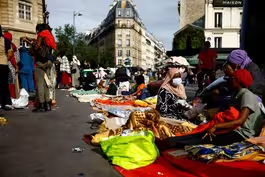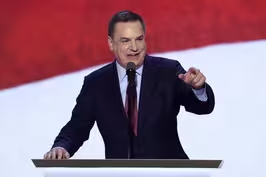
A year after Maui fires, residents face long road to recover
Clip: 8/8/2024 | 4m 51sVideo has Closed Captions
A year after Maui's devastating fires, residents still face long road to recovery
Thursday marks one year since the deadliest wildfire in modern U.S. history tore through the town of Lahaina on the island of Maui. The fires killed 102 people, displaced thousands of families and destroyed a precious place in Hawaiian history. The state reached a $4 billion settlement that will help pay for rebuilding, but it's a very slow process. William Brangham reports.
Problems playing video? | Closed Captioning Feedback
Problems playing video? | Closed Captioning Feedback
Major corporate funding for the PBS News Hour is provided by BDO, BNSF, Consumer Cellular, American Cruise Lines, and Raymond James. Funding for the PBS NewsHour Weekend is provided by...

A year after Maui fires, residents face long road to recover
Clip: 8/8/2024 | 4m 51sVideo has Closed Captions
Thursday marks one year since the deadliest wildfire in modern U.S. history tore through the town of Lahaina on the island of Maui. The fires killed 102 people, displaced thousands of families and destroyed a precious place in Hawaiian history. The state reached a $4 billion settlement that will help pay for rebuilding, but it's a very slow process. William Brangham reports.
Problems playing video? | Closed Captioning Feedback
How to Watch PBS News Hour
PBS News Hour is available to stream on pbs.org and the free PBS App, available on iPhone, Apple TV, Android TV, Android smartphones, Amazon Fire TV, Amazon Fire Tablet, Roku, Samsung Smart TV, and Vizio.
Providing Support for PBS.org
Learn Moreabout PBS online sponsorshipGEOFF BENNETT: Today marks one year since the deadliest wildfire in modern U.S. history tore through the town of Lahaina on the island of Maui.
The fires killed 102 people, displaced thousands of families, and destroyed a precious place in Hawaiian history.
Even though the state just reached a $4 billion settlement that will help pay for the ongoing cost of rebuilding, as William Brangham reports, one year later, it's still a very slow process.
WILLIAM BRANGHAM: From the air, Lahaina looks like a ghost town, this once vibrant community by the sea, a place steeped in Hawaiian history, now a patchwork of empty lots and charred debris.
But on the ground, however slow, there are signs of progress.
KIMO CARVALHO, Executive Director, HomeAid Hawaii: A lot of folks said they want to come back to West Maui, they want to be in West Maui, and we took that seriously.
WILLIAM BRANGHAM: One year ago today, flames broke out on this island driven by hurricane-force winds, which fed on fields of dry invasive grasses.
It came on so fast and so violently, the main road out of town was choked off.
In just hours, thousands of structures were consumed.
To escape the flames, some people jumped into the ocean.
But many weren't so lucky.
Over 100 people lost their lives in that inferno.
ED GAZMEN, Lahaina Resident: It's been so hard, very hard.
Never, I think in my life, would I have imagined that we would have something like this.
WILLIAM BRANGHAM: Left behind are broken hearts and a monumental recovery effort.
Hawaii Senator Democrat Brian Schatz: SEN. BRIAN SCHATZ (D-HI): One year later, people's lives are nowhere near back to normal.
National headlines may have moved on, but life for survivors has not.
They still need help.
WILLIAM BRANGHAM: Still, officials say they are ahead of schedule; 300,000 tons of fire debris and hazardous materials have been taken off island.
The Army Corps of Engineers has cleared almost 1,500 burned lots, readying them for rebuilding.
FEMA's Bob Fenton is coordinating the federal response.
BOB FENTON, Federal Emergency Management Agency: There's already 40 houses that are in some part of being constructed right now.
The majority of those properties have been turned back over so the permits can be pulled.
So we have done everything we can to ensure that we're returning it back to its pre-disaster condition and that it's safe to rebuild.
WILLIAM BRANGHAM: But for survivors like Josephine Fraser and her two sons, that progress has felt disjointed and very slow.
JOSEPHINE FRASER, Displaced Lahaina Resident: There were times where we had a 24-hour notice that we had to get out of the hotel.
WILLIAM BRANGHAM: Fraser and her family had to move nine times in as many months after the fire, shuttling from one hotel to another, as federal disaster officials struggled to house so many people who'd become homeless in an instant.
FEMA estimates it's spent nearly $400 million overall on housing assistance.
And Fraser is one of the luckier ones.
She recently became the first resident in a new modular home community, even though it's an hour's drive from Lahaina.
JOSEPHINE FRASER: It's awesome to have a roof, somewhere to call home, at least for now, until we go back into Lahaina.
WILLIAM BRANGHAM: Lahaina had a shortage of housing even before the fire.
But now, in this remote town, on a remote island where labor and materials are in the highest demand, the costs of building are even higher.
Hawaii's governor, Democrat Josh Green, says local homes for local people has to be the priority.
GOV.
JOSH GREEN (D-HI): Building housing is going to be critical in the second year.
We're changing the laws with short-term rentals and hoping to bring as many as 7,000 short-term rentals back to the market for local families on Maui.
WILLIAM BRANGHAM: There's also lingering questions of how to rebuild.
Who gets to decide what comes back?
How does the city prepare for rising sea levels?
Can officials build evacuation routes so, if there's another fire, people aren't trapped again.
Kuhio Lewis is with the Council for Native Hawaiian Advancement.
KUHIO LEWIS, Council for Native Hawaiian Advancement: When you start to see max exodus of the people, you start to change the fabric of Hawaii, and that's what's at stake, is the future of who Hawaii is as an identity, as a people, as a place.
WILLIAM BRANGHAM: That's the struggle the people of Lahaina are working through, how to build smartly for the future while honoring their historic past.
For the PBS "News Hour," I'm William Brangham.
Activists accuse Paris authorities of 'social cleansing'
Video has Closed Captions
Clip: 8/8/2024 | 6m 15s | Activists accuse authorities of 'social cleansing' for clearing homeless out of Paris (6m 15s)
A Brief But Spectacular take on how anyone can give
Video has Closed Captions
Clip: 8/8/2024 | 3m 29s | A Brief But Spectacular take on how anyone can give (3m 29s)
Details emerge on plots behind Taylor Swift cancellations
Video has Closed Captions
Clip: 8/8/2024 | 5m 45s | New details emerge on Vienna terror plots behind Taylor Swift concert cancellations (5m 45s)
Harris continues swing state blitz as Trump agrees to debate
Video has Closed Captions
Clip: 8/8/2024 | 4m 29s | Harris campaign continues battleground state blitz as Trump agrees to debate (4m 29s)
Harris gains in polls, changing the electoral map
Video has Closed Captions
Clip: 8/8/2024 | 5m 42s | With Harris gaining in the polls, a look at how the electoral map has changed (5m 42s)
NRCC chair: 'Environment is in our favor' to expand majority
Video has Closed Captions
Clip: 8/8/2024 | 4m 44s | NRCC chair says 'the environment is in our favor' for GOP to expand House majority (4m 44s)
Pelosi on 'The Art of Power' and confidence in Harris
Video has Closed Captions
Clip: 8/8/2024 | 11m 59s | Pelosi discusses her book, 'The Art of Power,' and voices confidence in Harris' chances (11m 59s)
Providing Support for PBS.org
Learn Moreabout PBS online sponsorship
- News and Public Affairs

FRONTLINE is investigative journalism that questions, explains and changes our world.

- News and Public Affairs

Amanpour and Company features conversations with leaders and decision makers.












Support for PBS provided by:
Major corporate funding for the PBS News Hour is provided by BDO, BNSF, Consumer Cellular, American Cruise Lines, and Raymond James. Funding for the PBS NewsHour Weekend is provided by...






